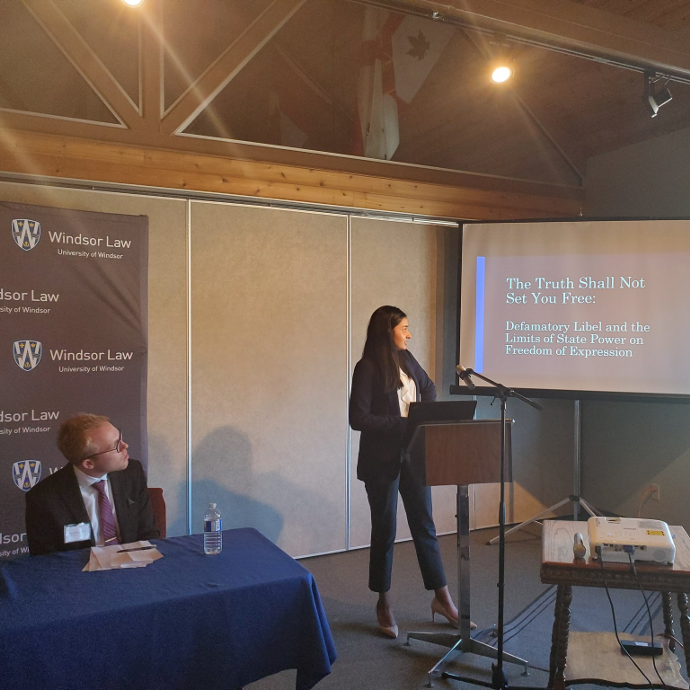
UAlberta Law student Melanie Cheddi thinks legal reform is overdue for an outdated section of the Criminal Code, and she's calling for more action to abolish the unconstitutional defamatory libel law.
"Without legislative changes from Parliament, a person posting criticism of a public official or quasi-public official on Twitter or Facebook may be the next to face criminal sanctions," said Cheddi.
The second-year law student presented her research at the 13th Annual Canadian Law Student Conference, hosted by the Windsor Review of Legal and Social Issues and Windsor Law, in early March. The national gathering promotes the discussion of law as a vehicle for social justice.
Cheddi's paper, "The Truth Shall Not Set You Free: A Call to Abolish Section 301 of the Criminal Code of Canada," analyzes the recent case of R v MacKinnon. Karen MacKinnon, a former acting mayor of Drumheller, was charged under the Criminal Code when she took to social media to criticize local public officials for corruption.
Section 301 of the Criminal Code states that anyone "who publishes a defamatory libel is guilty of an indictable offence and liable to imprisonment for a term not exceeding two years." What is most concerning about Section 301 is that it doesn't matter if the statement is true or false, said Cheddi.
"Section 301 has slipped through the cracks of history," she said.
Cheddi originally wrote the paper while interning for the Canadian Constitution Foundation, an organization dedicated to defending Canadians' constitutional rights and freedoms. The organization represented MacKinnon pro bono on a Supreme Court of Canada leave application, and Cheddi had the opportunity to discuss the case with MacKinnon in person.
"Not everyone has the resources to know the law is unconstitutional," said Cheddi, noting that MacKinnon originally entered into a peace bond rather than pursuing costly litigation.
Presenting at the conference gave Cheddi the opportunity to network and share her research with law students and legal scholars from across Canada.
"The conference was pushing towards new ideas-new ways to look at the law and new ways to reform it," said Cheddi. "It was refreshing."
A lively discussion period followed Cheddi's presentation. "No one disagreed that it was unconstitutional. It was more about figuring out where we go from here."
Cheddi plans to pursue publication for her research, asserting that it is a topic that requires more attention. She ultimately wants to see the law abolished.
"When you're in law, it is such a privilege to know what you know," said Cheddi. "You have to use that knowledge for good."